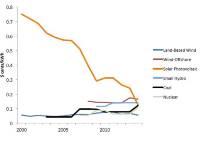Why Solar Power?
This page provides arguments why Nigerian governmental and private institutions, businesses and households should seriously consider solar photo voltaic (PV) power systems.
The first argument which should be raised here would be that of protection of the climate and climate change, but since most investors consider cost as a deciding factor we will start with the cost parity situation of Solar PV energy systems as compared to other conventional resources before coming back to the climate and health and environmental aspects.
But to cut the long story short before you dive into the details, the key benefits of solar PV are highlighted below.
Cost Factors
Diesel power generation parity of solar PV
Though grid parity is most commonly used in the field of solar power, and most specifically when referring to solar photo-voltaics (PV) in most countries in Europe and North America, Diesel and Petrol Power Generation Parity are the key drivers in most African countries were most households and businesses still rely to a large extant on diesel and petrol generators for their power supply.
CAPEX vs OPEX Costs
The truth today is that the full-lifetime costs of Solar PV systems (cost of purchase (so called Capital Expenditure Costs (CAPEX)) + cost of operation over its lifetime (so called Operations Costs (OPEX)) is already lower than that for diesel.
As PV systems do not use fuel and are largely maintenance-free, the levelized cost of electricity (LCOE) is dominated almost entirely by the capital cost of the system. This cost has fallen over the years for Solar PV bringing it on-par with small hydro and coal and even below diesel power generation as shown by reports from the World Economic Forum [Open report in a separate page].
The Realities of Cost in the Nigerian Solar PV Market
A key deterrent we identified is that most clients still view the initial higher Capital expenditure (CAPEX) for procuring solar PV systems as a deterrent, as they prefer to spread costs over the years even if they pay more over the lifetime.
The issue of higher capital costs (the cost of purchased and installation of solar PV (and solar PV battery systems) systems compared to costs for diesel generators of the same generation capacity however remains an issue which Dantata Solar is working with its partners to finds a viable and sustainable domestic Nigerian solution to.
Why not view the investment in a solar system same way you view the investment in your house or commercial building:
Whether you’re spending money to make an investment in solar energy, or giving that money to your utility provider, it is still money that is being spent. Deciding to go solar is very much similar to deciding to purchase a home or a commercial building. You can invest in yourself and take control of your energy costs, or continue to pay your utility provider for rented energy monthly, owing them frequent payments and remaining subject to their fees and requirements.
Other Arguments for Solar PV
Easy Installation:
Solar panels in homes and commercial buildings are relatively easy to install, typically only needing a few bolts to hold them secure and some basic wiring for inverters and storage systems besides configuration to connect into the existing home circuits.
Solar energy systems are durable:
Solar panels have no moving parts, and so are not damaged easily. This lowers the chance for an interruption in service. Solar panels used in Dantata Solar Ltd’s projects are from very well certified global leaders. These systems are exhaustively tested to ensure that they can withstand high winds and extreme weather conditions such as stormy rains and high temperatures. Even if something should occur that damages your solar panels, most systems come with multi-year warranties which can be negotiated on purchase of your system from Dantata Solar Ltd.
Cooling effect and coolness effect for homes and commercial buildings:
What’s cooler than to stand out in your neighborhood with the loud generators and the quiet island in the midst of all that noise with the sun powering your home? Be the one that all the others work to copy.
The coolness effect is something we as Nigerians know how to value. Studies have shown that solar PV panels act as additional roof shades helping to keep your building or car port cool in a roof mounted setting. That is in addition to supplying them with clean power. Solar panels soak up the sun’s rays, directing them away from the roof, whereas a roof without panels would allow heat to penetrate through it into the inside of the building.
Climate concerns, health and environmental protection:
Unlike conventional power systems, solar PV systems produce no harmful emissions that hurt the environment. They are clean, renewable processes that use the most natural of all resources: the sun. Even the energy used to produce the PV cells is paid back soon after. Depending on the type, Energy Pay-Back Time (EPBT) for PV systems is estimated to be between 0.5 and 1.4 years (Source: Fraunhofer Institute’s Photovoltaics Report of July 2017 – Read More in External Link). After that point, it’s all renewable, all the time.
A large number of reported cases of deaths due to fumes from generating sets as well as externalized costs of health effects of inhalation of fumes from generating sets, ground water pollution through spilled motor oils and fuels in poorly managed a/ serviced household and commercial generating sets as well as the stress induced health hazards from generator noise in African cities remain a very big potential win of increased deployment of solar PV and other renewable energy technologies in Nigeria.
